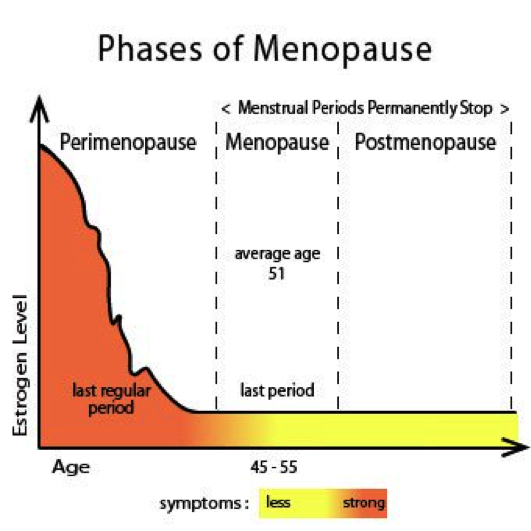
MENOPAUSE
Menopause is the process through which every aging woman will ceases to menstruate and be fertile. It is a normal part of life and is not considered a disease or a condition.
Menopause is diagnosed after a woman has gone 12 months without a menstrual period.
The menopausal symptoms also called climacteric symptoms may occur years before a woman’s final period. Some women may experience symptoms for months or years afterward.
The average year women reach menopause varies between countries, race and other factors. But in most cases, the average age for menopause is around 50 years old.
Despite being a natural process in the body of any woman, menopause can cause drastic changes that trigger severe symptoms.
How does menopause happen? every woman is born with a predetermined number of eggs, which are present in the ovaries. The ovaries are the glands that produce the two female hormones: estrogen and progesterone. These two hormones control ovulation and menstruation. Menopause happens when the ovaries no longer release an egg every month and menstruation stops.
Menopause is associated with acute symptoms as well as long-term symptoms and risks.
Most women approaching menopause – this is called pre-menopause – will have hot flashes. Hot flushes are a sudden feeling of heat that invades the upper body, neck and face, often accompanied with blushing and sweating. The severity of hot flashes varies from mild in most women to severe in others.
Other common symptoms around the menopause include:
- Irregular periods and menstruations, insomnia and night sweats, headaches, anxiety and mood swings, depression, fatigue (with or without muscle or joint pain), irritability, increased heart rate (tachycardia). Weight gain and slowed metabolism, thinning hair and dry skin and finally loss of breast fullness.
- Sexual and urinary symptoms include loss of libido, vaginal dryness and loss of bladder control
- It should be noted that not all women get all of these symptoms. some women experience milder or more severe symptoms than others.
- To score your menopause severity please click on the menopause severity scale………..

Long-term risks associated with menopause are:
- Heart and blood vessel (cardiovascular) disease: After menopause, heart disease is the leading cause of death in women as well as in men. The fall in estrogen levels leads to changes in the lipid profile of women with a decline in the good cholesterol, tendency for obesity and increase in blood pressure. Because of the tendency to become overweight or obese, menopausal women are advised to eat healthier and exercise regularly
- Osteoporosis: As soon as the first year post menopause, women start to lose their bone density at quite a fast rate, increasing the chances of women to develop osteoporosis. Osteoporosis leads to fragile bones and renders them weak and prone for fractures, especially the spine, hip and wrists.
- Problems in focusing and learning: Menopause can affect cognitive functions, such as concentration. Some women may also experience short-term memory problems and difficulty focusing for long periods.
- Urinary incontinence: Menopause causes the tissues of the vagina and urethra to lose their elasticity. This can result in frequent, sudden, and overwhelming urges to urinate. These urges can be followed by involuntary loss of urine. Women may involuntarily urinate after coughing, sneezing, laughing, or lifting during menopause. Women are encouraged to strengthen their pelvic floor muscles with the practice of the Kegel exercises. Using a topical vaginal estrogen may help relieve symptoms of incontinence.
- Sexual function: the loss of elasticity leads to decreased moisture and vaginal dryness. This can cause discomfort and slight bleeding during sexual intercourse. Also, decreased sensation may reduce the woman’s desire for sexual activity (libido).
Water-based vaginal moisturizers and lubricants may help. These products will regulate the vaginal pH through their content in probiotics, lactic acid and other plant extracts that rebalance bacterial flora and have antiseptic and antifungal effect. In more severe cases, the use of local low dose vaginal estrogen treatment is sometimes recommended.
The treatment of menopause varies between women and healthcare givers. While some prefer to administer hormones to replace the decrease the loss of estrogen mainly, others prefer to use more natural and less risky products that may alleviate the menopausal symptoms. the most bothersome symptoms are hot flushes and night sweats.
One of these products that are best in controlling those 2 symptoms is the herbal based phytoestrogen. The potent ones like HOPS “humulus lupus” mimic greatly the natural estrogen and help maintain a woman’s comfort during menopause by decreasing her vasomotor symptoms. Salvia Officinalis leaves extracts from Sage have been shown to decrease night sweats and hot flushes in post-menopausal women as well. Finally, it is well stablished that oxidative stress plays a negative role in post-menopausal women making it another target to fight in order to improve the wellbeing of these ladies. Concentrated melon juice has the highest superoxide dismutase activity SOD). Through its powerful antioxidant activity, SOD helps fighting oxidative stress, restores wellbeing of menopausal women and improves symptoms of stress and fatigue.
